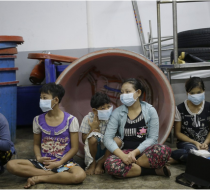Campaign aims to make Hong Kong a key player in fight against slavery Favorite
At least three international companies have committed to join the fight against slavery in a campaign that aims to make Hong Kong the hub in Asia to tackle human-trafficking.
The Slave Free campaign is being launched by Hong Kong law student and anti-human trafficking advocate Julie Lim, who said it has already caught the attention of a cosmetics brand, a clothing retail company and a multinational electronics company. One more business has expressed interest in joining.
“Some [companies’] headquarters have no idea what’s happening in their factories, mostly located in remote areas and ran by middlemen. I started thinking of how to solve this problem, and thought that turning negative activism into positive activism could be a solution,” the South Korean said.
Lim, 34, a juris doctor candidate in law at the Chinese University of Hong Kong, has just returned from presenting the campaign in Boston at the Clinton Global Initiative annual meeting. The initiative, established in 2005 by the Clinton Foundation, convenes each year with emerging leaders to discuss and implement solutions for the world’s most pressing issues.
Instead of going against major international companies and focusing on bad publicity, Lim decided to take a fresh approach: “We need to work with these corporations … the project aims at integrating human rights into business practises in order to eliminate labour trafficking in global supply chains,” Lim explained.
Hong Kong is the perfect starting point, she said: “The headquarters in Asia of most major corporations are in the city, so Hong Kong can be a hub to solve this issue.”
The names of the companies joining the campaign will be revealed when the project is officially launched in January.
“Most retail brands are really interested in this issue, but they are really afraid. They feel that if they join the campaign, they are admitting they have a problem,” she added.
Lim, who previously ran a non-profit organisation that advocated for gender equality in South Korea, said she planned to provide consulting and work with corporations to help them comply with existing regulations.
In recent years, fire hazards and protests have exposed the poor working conditions that thousands of workers face, particularly in garment and electronics factories across Asia.
A report released last year by labour rights non-profit India Committee of the Netherlands, found that some factories in Bangalore, India – suppliers of major international fashion chains – kept workers in hostels under constant surveillance and in forced confinement.
In Thailand, despite some efforts from the government, activists claim that slave labour continues on the vessels that sustain the country’s seafood industry.
According to the latest statistics, of the world’s estimated 40 million people trapped in modern slavery last year, about 25 million were in forced labour – this included those who were forced to work under the threat of violence or by other means, such as debt bondage and retention of passports. From this number, some 16 million faced exploitation in the private sector, such as domestic work, construction and agriculture.
The Asia-Pacific region accounts for the largest number of forced labour victims in the world.
Hong Kong is also not immune to human-trafficking issues. Studies have shown that domestic workers, who are often coerced to pay illegal fees to employment agencies, are particularly vulnerable to abuse in the city.
For the second consecutive year, Hong Kong was ranked on the Tier 2 Watch List by the 2017 US Trafficking in Persons Report for continually failing to tackle cases of human-trafficking and forced labour – mostly due to lacking laws that effectively deter such crimes.
Earlier this year, former ambassador to the US department’s Office to Monitor and Combat Trafficking in Persons, Luis CdeBaca, highlighted the crucial role that the financial industry in Hong Kong could play at combating human-trafficking in the region.
“Because of its influence in Asia as a legal centre, a banking centre and a place of due diligence, the Hong Kong business community has an opportunity to impact human-trafficking in Thailand, Cambodia, Malaysia, Indonesia, as deals get made or loans get given,” CdeBaca told the Post, on the sidelines of the Thomson Reuters Anti-Slavery Summit.
written by Raquel Carvalho
Saturday, 28 October, 2017








